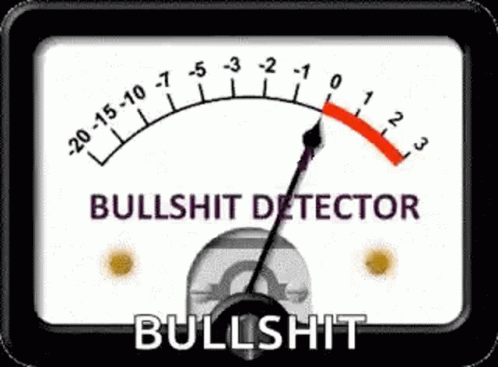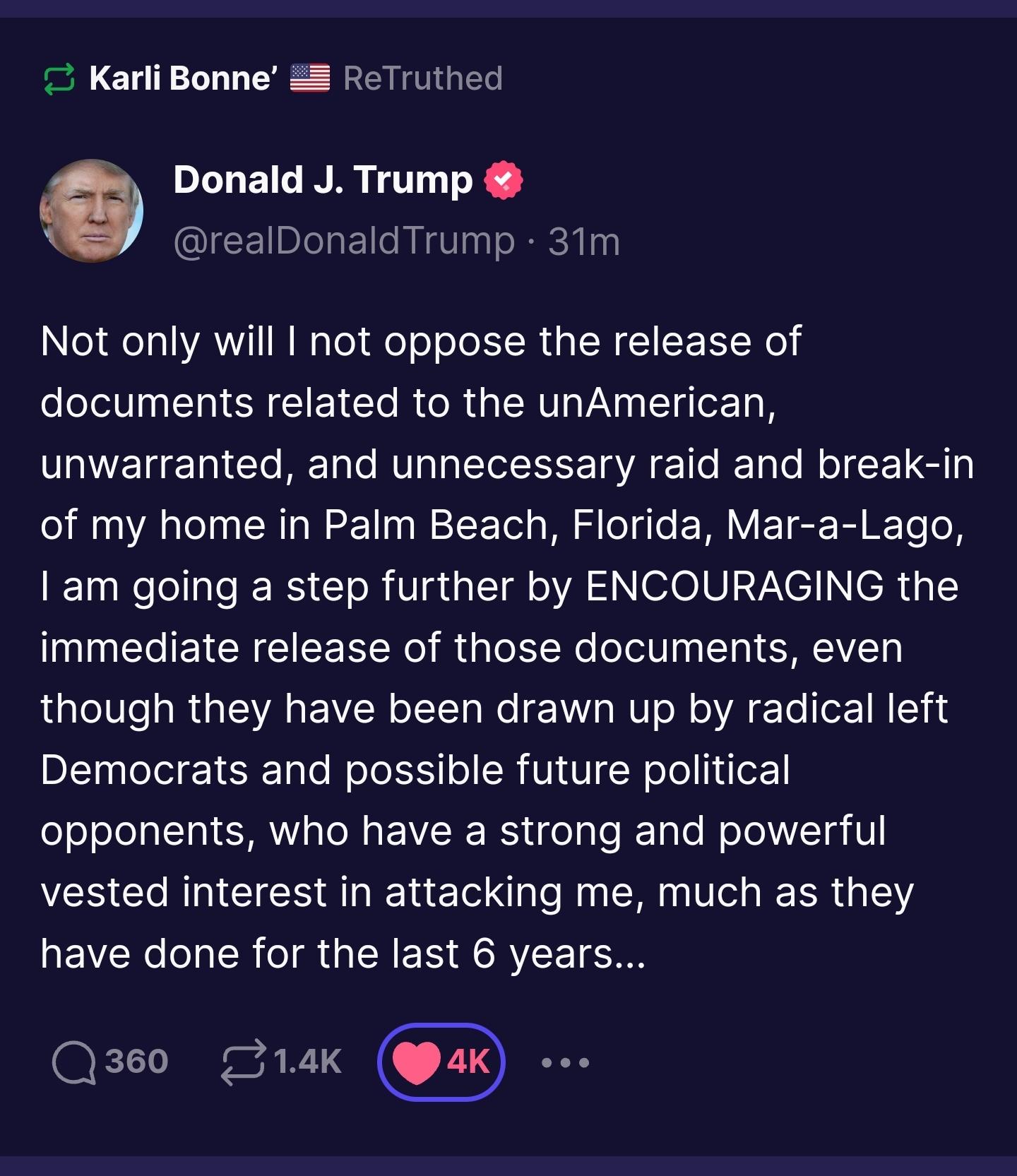You are using an out of date browser. It may not display this or other websites correctly.
You should upgrade or use an alternative browser.
You should upgrade or use an alternative browser.
Mar-a-Lago Raided.....Deep State has completely lost control of their narrative and desperation reaches peak levels
- Thread starter MAGAking1
- Start date
And what is it that are telling you? Goofball listening to Trump still?... as long was you want to be a shit towards me....My turn....you're a gullible old man goofusNuclear documents, LMFAO, they know you'll swallow and regurgitate anything they tell you without reflux. You're that guy
Again, tell us how anyone knows anything about what they're looking for and / or what they found.
It's OK, that's really a rhetorical question. I know the answer, and you should, although like most liberals you find the truth to be overrated
One day Alice, one day
View attachment 41308
But until that day, you're that guy
Guess we'll see, like trump winning the election in the first place..always right? sure you are...
The NFL is right around the corner Mcflounder99
Lol. Donger seriously made that statement?
John Brennan LOL
So nothing will come of this, BUT they're gonna try and play out their false reality in the Fake News.
They did it with Russiagate, and Covid (lest you think this is ONLY an anti-Trump thing), Ukraine, Steeringwheelgate... and now they're doing it with this classified docs bullshit.
Same transparent playbook from the same corrupt DS players.
"I don't listen to the corp media" - Ding Donger LOL
Are you ever dumber than dumb.
I guess it's real easy to extinguish this as bullshit, all Trump has to do is release the search warrant his attorney was served.
IF TRUE,
Trump hosts a Saudi-backed golf tournament

Trump defends hosting Saudi-backed golf tournament by falsely claiming 'nobody's gotten to the bottom of 9/11'
Trump was answering a question about protests by families of 9/11 victims against the tournament’s being held at one of his golf courses in New Jersey.www.nbcnews.com
Saudi Arabia paid Kushner $2 billion
And then Flynn

Whistleblowers: Flynn backed plan to transfer nuclear tech to Saudis
Investigators fear President Trump is still considering the plan, which was pushed by Flynn and Trump friend Tom Barrack.www.nbcnews.com

Michael Flynn hid $200K payments for Middle East work
Trump's first National Security Advisor did not disclose $200,000 in payments from consulting work in the Middle Eastwww.salon.com
Sure guy
Maybe we can get 50 intlelligence officers ro weigh in on it next .
‘Quick Melania, before we go to New Jersey, put the nuclear missile plans in your sock drawer.’
This one is almost as good as the pee pee tape .

You never get anything right. If it wasn’t for sheriff Joe, you’d be the biggest dope here.Sure guy
Maybe we can get 50 intlelligence officers ro weigh in on it next .
‘Quick Melania, before we go to New Jersey, put the nuclear missile plans in your sock drawer.’
This one is almost as good as the pee pee tape .

Tomorrow, his attorneys will file a motion to block the documents from being unsealed. Then Trump will put out a statement claiming his lawyers are blocking the propaganda from the DOJ because of blah, blah, blah.
Mark it...
None of it matters, until we see those nuclear weapons like documents that don't exist
And what is it that are telling you? Goofball listening to Trump still?... as long was you want to be a shit towards me....My turn....you're a gullible old man goofus
Guess we'll see, like trump winning the election in the first place..always right? sure you are...
The NFL is right around the corner Mcflounder99
What am I telling you? Seriously? You have bought and sold and regurgitated everything about Trump for the last 5 years, and you've been wrong each and every time without exception. Yet you dutifully line up like the pawn that you were raised to be and tell us Trump took secret nuclear weapons documents. I can't respect that, I can only laugh
And in your typical uninformed fashion, the norm for your ilk, you accuse me of listening to Trump when what I'm saying is they will not find any threats to national security. I have no idea what Trump is saying, but I've been watching the weaponizing of our public institutions for too long now.
Maybe you'll grow up some day. As people acquire wisdom, wealth and experience, they move to the right. And no simpleton, it's not because they're selfish
any adults in the room?
==========================
Attorney General Bill Barr said that what happened to President Trump during and after the 2016 election was “abhorrent” and a “grave injustice.” He also then said that no criminal investigation of Hillary Clinton, former President Obama or Vice President Biden would take place because "this cannot be, and it will not be, a tit for tat exercise.”
“The law enforcement and intelligence apparatus of this country were involved in advancing a false and utterly baseless Russian collusion narrative against the president. The proper investigative and prosecuted standards of the department of justice were abused, in my view, in order to reach a particular result. We saw two different standards of justice emerge: One the applied to President Trump and his associates and the other the applied to everybody else. We cannot allow this ever to happen again.”
===========================
haha, it's all they know, we are morphing into our worse nightmares
I read an article yesterday talking about foreign opinions. They are essentially surprised by some of our social agenda policies and they're seeing the Fall of the Roman Empire. It's happened to every world leader before us, it's naive to think it can't happen to us. We're a divided nation with an uninformed electorate and politicians who only care about preserving their jobs. We're tearing down the very fabric that enabled our greatness, that would be the Constitution which libtard nation mostly deplores. We're destroying our national security, ignoring our laws, and calling our most productive citizens "the biggest problem". We reward complacency and laziness and having babies as young teenagers, while we punish business owners and job creators (yes, hiring 86,000 IRS agents will do just that)
We (read liberals) are fucked in the head
==========================
Attorney General Bill Barr said that what happened to President Trump during and after the 2016 election was “abhorrent” and a “grave injustice.” He also then said that no criminal investigation of Hillary Clinton, former President Obama or Vice President Biden would take place because "this cannot be, and it will not be, a tit for tat exercise.”
“The law enforcement and intelligence apparatus of this country were involved in advancing a false and utterly baseless Russian collusion narrative against the president. The proper investigative and prosecuted standards of the department of justice were abused, in my view, in order to reach a particular result. We saw two different standards of justice emerge: One the applied to President Trump and his associates and the other the applied to everybody else. We cannot allow this ever to happen again.”
===========================
haha, it's all they know, we are morphing into our worse nightmares
I read an article yesterday talking about foreign opinions. They are essentially surprised by some of our social agenda policies and they're seeing the Fall of the Roman Empire. It's happened to every world leader before us, it's naive to think it can't happen to us. We're a divided nation with an uninformed electorate and politicians who only care about preserving their jobs. We're tearing down the very fabric that enabled our greatness, that would be the Constitution which libtard nation mostly deplores. We're destroying our national security, ignoring our laws, and calling our most productive citizens "the biggest problem". We reward complacency and laziness and having babies as young teenagers, while we punish business owners and job creators (yes, hiring 86,000 IRS agents will do just that)
We (read liberals) are fucked in the head
never be surprised at what a group of Zolofted Liberals from the FBI, WaPo, and the JoBama Administration can conjure up in a conference room when discussing Donnie. LOL @ the assertion that him calling Kim Jong Un "Rocket Man" might have been code for giving away America's nuke secrets.???????
So let me get this straight. They're going with "Trump stole nuclear weapon secrets because he's an evil dictator who wants to take over the world?" LMAO.
what's next? they gonna start giving 12 YO girls hysterectomies because they wear sneakers and hoodies? oh wait...
hahaha right MAGA goofball...keep listening, as DT's right behind you making MAGA fools look like assholes the size of a garbage can lids....What am I telling you? Seriously? You have bought and sold and regurgitated everything about Trump for the last 5 years, and you've been wrong each and every time without exception. Yet you dutifully line up like the pawn that you were raised to be and tell us Trump took secret nuclear weapons documents. I can't respect that, I can only laugh
And in your typical uninformed fashion, the norm for your ilk, you accuse me of listening to Trump when what I'm saying is they will not find any threats to national security. I have no idea what Trump is saying, but I've been watching the weaponizing of our public institutions for too long now.
Maybe you'll grow up some day. As people acquire wisdom, wealth and experience, they move to the right. And no simpleton, it's not because they're selfish
eat it up like you've been for the past 5 years...MAGA bean counter.
who among us haven't taken a few items on our last day on the job....lol
Trump Search Said to Be Part of Effort to Find Highly Classified Material
The former president said he will not object to the Justice Department’s move to release the search warrant used to carry out the search of his Florida home.Attorney General Merrick B. Garland moved on Thursday to make public the legal authorization for the F.B.I.’s search of former President Donald J. Trump’s home in Florida, which was carried out as part of the government’s effort to account for documents that one person briefed on the matter said related to some of the most highly classified programs run by the United States.
Mr. Garland said he had personally approved the search after the failure of “less intrusive” attempts to retrieve material taken from the White House by Mr. Trump.
Mr. Garland provided no details. But the person briefed on the matter said investigators had been concerned about material from what the government calls “special access programs,” a designation that is typically reserved for extremely sensitive operations carried out by the United States abroad or for closely held technologies and capabilities.
Government officials have expressed concern that allowing highly classified materials to remain at Mr. Trump’s home could leave them vulnerable to efforts by foreign adversaries to acquire them, according to another person familiar with the Justice Department’s thinking.
Late on Thursday night, Mr. Trump said he would not oppose the motion to release the warrant and the inventory.
He wrote on his social media site, Truth Social, that he was “encouraging” their release. “Release the documents now!” he said.
In a clipped, two-minute statement to reporters at the Justice Department’s headquarters, Mr. Garland said he decided to break his silence and make a public statement because Mr. Trump had disclosed the action himself. The attorney general also cited the “surrounding circumstances” of the case and the “substantial public interest in this matter.”
But Mr. Garland also used the brief appearance to defend, at least implicitly, the Justice Department’s handling of the case against the torrent of criticism directed at it by Mr. Trump and his allies.
“Upholding the rule of law means applying the law evenly, without fear or favor,” Mr. Garland said. “Under my watch that is precisely what the Justice Department is doing.”
Minutes before Mr. Garland took the podium, a top official in the Justice Department’s national security division filed a motion to unseal the search warrant and an inventory of items retrieved in the search on Monday.
While the inventory provided to Mr. Trump’s team after the search is unlikely to reveal details about the specific documents he kept, it refers to an array of sensitive material, according to a person with knowledge of the matter.
Judge Bruce Reinhart, the federal magistrate in the Southern District of Florida who approved the search warrant and is handling the motion to unseal it, had issued an order requiring the Justice Department to serve a copy of its motion to Mr. Trump’s lawyers. It said the department would have to tell the judge by 3 p.m. on Friday whether Mr. Trump opposed the motion.
Mr. Garland’s statement amounted to a challenge to Mr. Trump, who has been free to release the search warrant and the list of items taken during the search on his own, but has declined to do so. Many Trump allies and Republicans have also called on Mr. Garland to explain his decision, adding political complexity — or hypocrisy — to any decision by Mr. Trump to oppose making the search warrant public.
The Justice Department did not seek to release the affidavits — which contain much more information about the behavior of Mr. Trump and evidence presented by others — that were used to obtain the warrant.
The public statement by Mr. Garland came at an extraordinary moment, as a sprawling set of investigations into the former president on multiple fronts gained momentum even as Mr. Trump continued to signal that he might soon announce another run for the White House.
Mr. Trump invoked his Fifth Amendment right against self-incrimination on Wednesday in a civil investigation into his business practices by the New York attorney general, and a close ally in the House had his phone seized by federal agents this week in one strand of the investigation into Mr. Trump’s efforts to remain in power despite his election loss in 2020.
Mr. Garland also spoke on the same day that law enforcement officers shot and killed a man who they said tried to break into the F.B.I.’s Cincinnati office on Thursday. Investigators were looking into whether he had ties to extremist groups, including one that participated in the Jan. 6 attack on the Capitol, according to two law enforcement officials familiar with the matter.
The search on Monday of Mr. Trump’s home at Mar-a-Lago, his private club, was the most explosive development yet in the various inquiries. The investigation centers on whether he improperly took sensitive materials with him from the White House when his term ended and then failed to return all of them — including classified documents — when the National Archives and the Justice Department demanded that he do so.
Months before the F.B.I. arrived at Mar-a-Lago, Mr. Trump had received a subpoena this spring in search of documents that federal investigators believed he had failed to turn over earlier in the year, when he returned 15 boxes of material to the archives, three people familiar with the matter said.
The existence of the subpoena helps to flesh out the sequence of events that led to the search, and suggests that the Justice Department tried methods short of a search warrant to account for the material before taking the politically explosive step of sending F.B.I. agents unannounced to Mar-a-Lago.
continued






